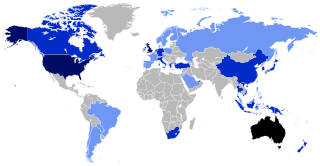History
In New South Wales
| | This section needs expansion. You can help by adding to it. (January 2018) |
A wave of post-war immigrants migrated from Europe to Sydney, in particular the Portuguese, who settled in the inner-city areas of Petersham (sometimes considered Australia's largest Portuguese enclave) and Surry Hills.
In Victoria
Portugal’s links with Australia may extend as far back as the sixteenth century, predating Captain Cook's voyage to Australia by 250 years. Some evidence suggests that Portuguese explorers were the first Europeans to visit Australia.
Three hundred years later, a few Portuguese were among the earliest settlers in Australia. Emanuel and Ana Serrão and their infant daughter arrived in Sydney in 1824, and moved to Warrnambool with their family in 1852. Few followed, and by 1901 only 86 Victorians were Portugal-born. Males made up 90% of the community.
The Portugal-born population in Victoria declined in the early twentieth century, and by 1933, only 12 were recorded in the census.
While the post-war migration boom had little effect on the Portuguese population of Victoria, the late 1960s saw the beginning of a dramatic increase in immigration. After the Portuguese colonial wars in Angola and Mozambique ended in 1974, and the former Portuguese colony of East Timor was invaded by Indonesian troops in 1975, more ethnic Portuguese immigrants settled in Victoria. The number of immigrants from Portugal also increased, from 131 in 1966 to 2,335 in 1986.
By 2016, 2,727 Portugal-born migrants were living in Victoria. The Portuguese community in Victoria today also includes people from the former Portuguese colonies of Macau, East Timor, Cape Verde, Mozambique, Angola, Goa and Brazil.
Members of the Portugal-born community today are predominantly employed as tradespeople and workers within the manufacturing and construction industries. Almost three-quarters still speak Portuguese at home.
The community is supported by organizations including the Portuguese Community Council of Australia, which serves as an umbrella organization for all Portuguese people in Australia. Portuguese language radio programs, language classes and sporting clubs help maintain the community in Victoria. Events such as performances by Madeira Folk Dancing provide an opportunity for the wider community to appreciate the rich, vibrant Portuguese culture. [13]
In Western Australia
Portuguese migrants from the islands of Madeira settled in Fremantle in Western Australia in the 1950s and established a fishing community which, by the mid-1980s, had grown to about 6,000 people, including their descendants. [14] Since then, Perth and Western Australia in general have been a frequent destination for Portuguese students and skilled labor, and although no mass-migration has occurred, the Portuguese population is still prevalent in the state. John Da Silva, the founder and owner of Bell-Vista vegetables, one of Western Australia's biggest vegetable provider migrated to Fremantle in the Portuguese migrant wave to that area in the 1960s. [15]











